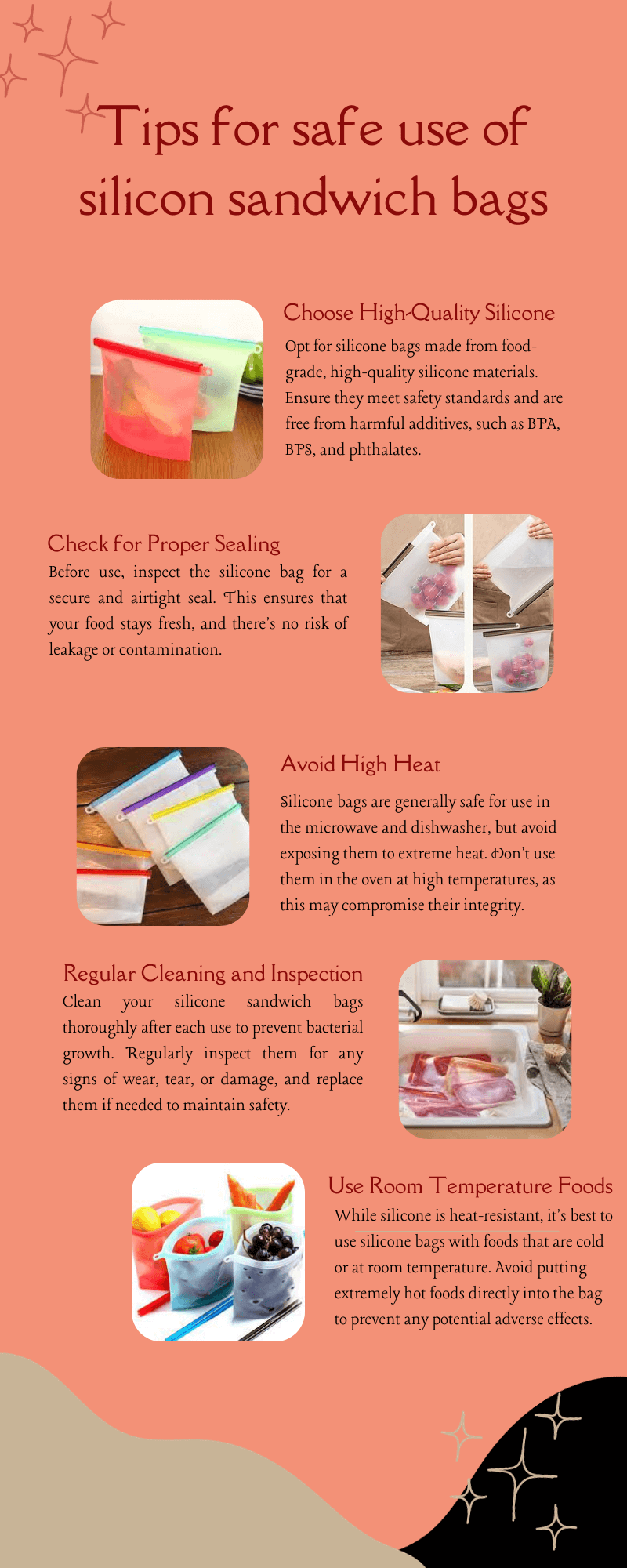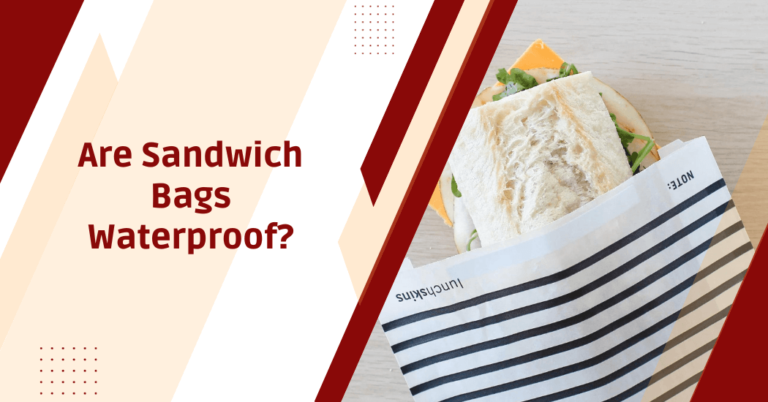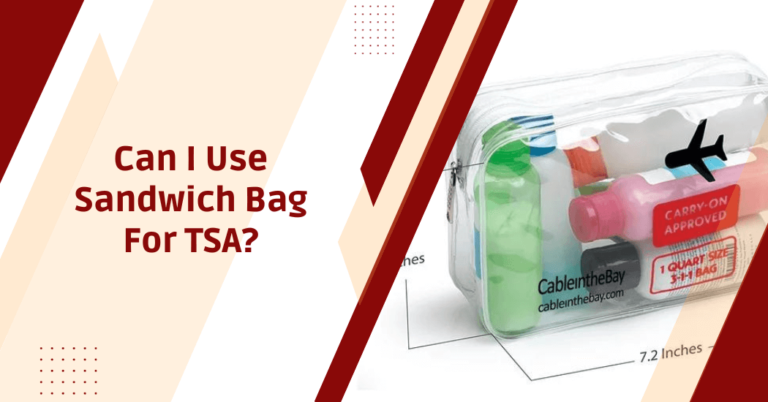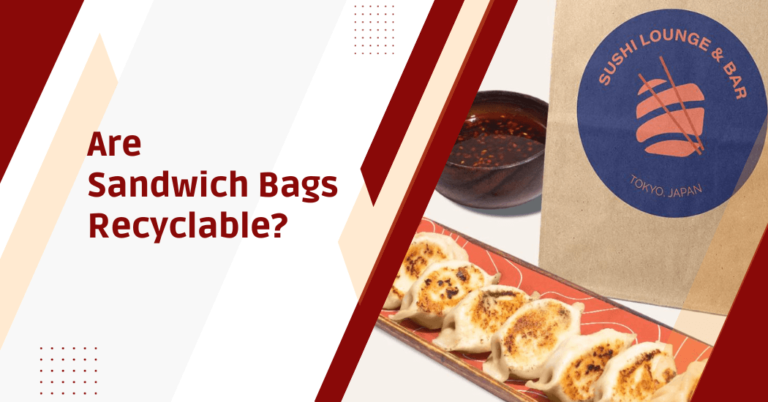Are silicone sandwich bags safe?
In an age of increasing environmental awareness and a growing commitment to reducing single-use plastics, silicone sandwich bags have emerged as a seemingly eco-friendly alternative. These flexible, reusable containers offer a convenient and sustainable option for storing food and snacks, reducing the need for disposable plastic bags.
However, as we strive to make more responsible choices for our health and the environment, a critical question arises: Are silicone sandwich bags truly safe for everyday use?
In this blog post, we’ll delve into the safety aspects of silicone sandwich bags, examining their materials, potential health concerns and environmental impact, to help consumers make informed decisions about their usage.
Are Silicone Sandwich Bags Safe?
Silicone sandwich bags are generally considered safe for food storage. Silicone is a non-toxic material that is free of harmful chemicals like BPA, phthalates and PVC, which can be found in some plastic containers.
These bags are also heat-resistant and can be used in the microwave, freezer and dishwasher without degrading or leaching harmful substances into your food.
Additionally, silicone bags are durable and can be reused many times, reducing the environmental impact of disposable plastic bags. However, it’s essential to ensure that the silicone bags you purchase are made from high-quality, food-grade silicone to guarantee safety.
Some lower-quality silicone products may contain fillers or additives that could potentially leach into food, so it’s wise to stick to reputable brands.
Overall, when used as intended and maintained properly, silicone sandwich bags can be a safe and eco-friendly alternative to traditional plastic bags for food storage.
Potential benefits of using silicone sandwich bags for food storage
Here is the list of benefits of using silicone sandwich bags for food storage:
- Eco-Friendly: Silicone sandwich bags are reusable, reducing the need for single-use plastic bags and consequently decreasing plastic waste.
- Non-toxic Material: Made from silicone, a material free from harmful chemicals like BPA, phthalates and PVC, these bags are a healthier choice for food storage.
- Heat-Resistant: They can safely be used in the microwave, freezer and dishwasher without degrading or releasing harmful substances into your food. (free meat in sandwich bags)
- Durability: Silicone bags are incredibly durable, capable of withstanding repeated use over a long period.
- Cost-Effective: Although the initial cost is higher than disposable plastic bags, the longevity and reusability of silicone bags make them a cost-effective solution in the long run.
- Versatility: They are perfect for storing a variety of food items, from sandwiches to cut fruits and vegetables and even liquids like soups and sauces.
- Easy Maintenance: Silicone bags are easy to clean, often dishwasher safe and do not retain stains or odors like some plastic containers.
- Leak-Proof: Unlike some plastic bags that can easily tear or leak, silicone sandwich bags are designed to be leak-proof, keeping your food fresh and preventing spills.
- Space-Saving: The flexible nature of silicone bags allows them to be easily folded and stored, taking up less space in your kitchen cabinets or lunch bag.
- Sustainable Choice: By reducing the need for disposable plastic bags, silicone sandwich bags contribute to a more sustainable way of living and help protect the environment.
Overall, using silicone sandwich bags for food storage has numerous benefits, making them an excellent choice for those looking for a safe, convenient and eco-friendly option.
So next time you pack your lunch or store leftovers, consider reaching for a silicone bag instead of a traditional plastic one.
Safety concerns associated with silicone sandwich bags
Here are some potential health concerns that have been raised about silicone sandwich bags:
- Leaching of chemicals: While silicone is considered to be a safer alternative to plastic, it’s essential to note that no material is entirely risk-free. Some studies suggest that certain types of silicone may still contain trace amounts of chemical substances that could potentially leach into food. However, the amount is small and falls within acceptable limits set by regulatory bodies, making it unlikely to cause significant harm.
- Staining and odors: It’s also worth noting that silicone bags are not entirely stain and odor-resistant. Some foods, like tomato-based dishes, may leave a slight stain or residual odor on the bag even after washing. While this doesn’t necessarily pose a health risk, it may be off-putting for some users.
- Degradation with use: As with any reusable product, silicone bags can degrade over time with frequent use and washing. This can result in small tears or cracks in the material, which could potentially compromise its safety and effectiveness for food storage. It’s essential to inspect your silicone bags regularly and replace them if you notice signs of wear and tear.
- Potential for Seal Deterioration: Over time and with repeated use, the seals on silicone bags can weaken. A weak seal may allow air to enter the bag, which could lead to food spoilage.
By being aware of these potential concerns and taking proper care of silicone sandwich bags, consumers can minimize any risks associated with their usage. It’s also crucial to follow the manufacturer’s instructions for the safe use and storage of silicone bags.
Tips for safe use of silicon sandwich bags
Here are some tips for using silicone sandwich bags safely:

- Choose high-quality, food-grade silicone: When purchasing silicone sandwich bags, opt for brands that use high-quality, food-grade silicone to ensure safety.
- Avoid extreme temperatures: While silicone is heat-resistant, it’s not recommended to expose it to extreme temperatures like direct flame or hot surfaces. Be cautious when using them in the microwave and avoid placing them too close to heating elements in the oven.
- Inspect regularly: Check your silicone bags regularly for any signs of wear and tear, such as cracks or tears in the material. Discard if you notice any damage.
- Properly seal: Ensure that you properly seal your silicone bag before storing it to prevent air from entering and potentially causing food spoilage.
- Wash thoroughly: Clean your silicone bags thoroughly after each use, paying attention to any stains or odors that may linger. Allow them to dry completely before storing.
- Storage: Store your silicone bags in a cool, dry place away from direct sunlight and heat sources.
- Microwave use: Silicone bags are generally safe for microwave use. However, make sure to open the bag slightly to allow steam to escape, preventing pressure buildup. Do not seal the bag tightly when microwaving.
- BPA and toxin-free: Silicone bags are typically free of BPA, PVC and other harmful chemicals found in some plastics. Always check the product label to confirm.
By following these safety guidelines, you can ensure the safe use of silicone sandwich bags for food storage.
As with any product, it’s essential to be mindful of potential risks and take proper care while using them. But overall, when used correctly, silicone sandwich bags can be a safe and sustainable choice for storing food.
Alternatives to silicone sandwich bags
Some alternative options for food storage to consider include:
- Plastic sandwich bags: While plastic bags may not be the most eco-friendly option, they are widely available and affordable. However, they do come with concerns about potential chemical leaching and environmental impact.
- Glass containers: Glass containers are a durable and non-toxic option for storing food. They are also heat-resistant, making them suitable for use in the oven or microwave.
- Stainless steel containers: These are another safe and long-lasting choice for food storage. They can withstand extreme temperatures and do not leach any chemicals into food.
- Beeswax wraps: Beeswax wraps are made from fabric coated with beeswax, creating a seal that can be molded around food items. While they may not be suitable for liquids or soups, they are a great eco-friendly alternative to plastic wrap.
- Reusable cloth bags: Reusable cloth bags are a sustainable and cost-effective option for storing snacks or sandwiches. They are washable, making them easy to maintain.
- Plastic sandwich bags:
Ultimately, the best option for food storage will depend on individual needs and preferences.
However, by choosing reusable and non-toxic alternatives like silicone sandwich bags, we can all make small yet impactful changes toward a more sustainable lifestyle. Let’s do our part in protecting the environment for future generations.
Wrap Up
In conclusion, silicone sandwich bags are a safe and convenient choice for food storage, with various benefits such as durability, non-toxicity and sustainability. While there may be some potential concerns associated with their usage, these can be minimized by following proper care guidelines.
And if silicone is not your preferred option, there are plenty of other alternatives available that are also safe and sustainable. With mindful choices, we can make a positive impact on the environment and our health.
So let’s choose wisely and opt for eco-friendly options like silicone sandwich bags whenever possible. We hope this guide has provided helpful information on the safe use and care of silicone sandwich bags.





